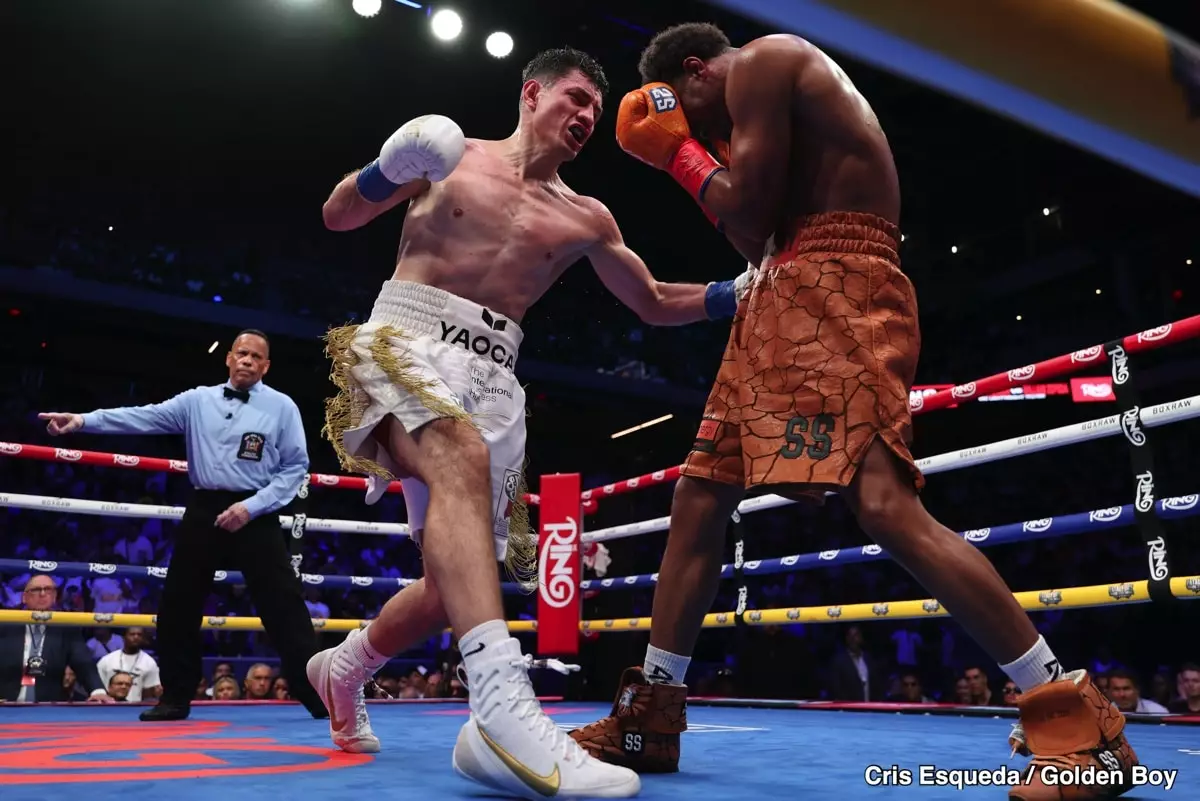The recent showdown at Louis Armstrong Stadium in Queens marked a pivotal moment for Hamzah Sheeraz, signaling his arrival as a genuine contender in the super middleweight division. Coming into the fight with an undefeated record, Sheeraz’s performance was nothing short of spectacular, culminating in a fifth-round knockout that left fans and critics alike in awe. What struck most was not just his power but his resilience—after a tentative start, he found his rhythm, unleashing a ferocious combination that overwhelmed Edgar Berlanga. The fight revealed Sheeraz’s mental fortitude, as he pressed on after an early rough patch, showcasing a fighter who refuses to be underestimated. His willingness to stand in the middle of the ring and declare his intent to challenge Canelo Alvarez in 2026 demonstrates both confidence and ambition. Yet, while his talent is undeniable, critics must acknowledge that such explosive performances often hinge on moments of vulnerability—He still needs to refine his ability to adapt earlier in fights but demonstrated enough grit and punching power to suggest he will be a major player in the division for years to come.
The Controversy of Judging and the Cost of Favoritism
The co-feature involving Shakur Stevenson and William Zepeda exposed a troubling aspect of modern boxing: biased judging. Despite Zepeda’s aggressive effort—outworking Stevenson in nearly every round—judges awarded Stevenson a unanimous decision, with scores that many—including myself—believed did not accurately reflect the fight’s true dynamics. This blatant example of favoritism raises uncomfortable questions about the integrity of the scoring system, especially in fights held within the homeland of the favored fighter. Boxing’s reputation suffers when subjective judging clouds the outcome, and fans are left questioning whether the results truly reflect skill and effort or simply the influence of home advantage. Such incidents undermine the sport’s credibility and emphasize the need for reform—strict judging criteria, transparent scorecards, and diverse panels could help restore faith in the process. Regardless of the controversy, Zepeda’s effort was commendable; it highlighted how a fighter’s resilience and volume can sometimes be overshadowed by bias, fostering an ongoing debate about fairness in the sport.
Subriel Matias: The Ruthless Grinder
Another highlight of the night was Subriel Matias’s gritty victory over Alberto Puello. Matias’s relentless pressure and refusal to back down demonstrated that boxing is as much about heart and persistence as it is about technique. His nonstop aggression, combined with an ability to force Puello into a defensive posture, paid dividends with a majority decision. The fight was marred by excessive holding from Puello, an infraction that was unfortunately tolerated by the referee, yet the judges seemed to account for this misconduct, obvious to seasoned viewers. Matias’s win is significant because it positions him as a formidable champion in the 140-pound division, especially with the upcoming defense against Dalton Smith in Riyadh. That bout has the potential to redefine the division’s landscape, provided Matias maintains his aggressive style and continues to implement the relentless pressure that served him so well tonight. His victory underscores a fundamental truth: fighters who display unyielding tenacity often leave the ring with their hand raised, regardless of controversial officiating.
Emerging Talent and New Challenges
The card also highlighted rising stars like David Morrell and Reito Tsutsumi, whose performances foreshadow promising futures. Morrell’s gritty resilience, rallying after being knocked down in the fifth, showcased his mental toughness—an essential attribute for fighters aiming to reach the elite level. His ability to adapt and impose his will in later rounds suggests he’s on the cusp of a title shot if he continues refining his skills. Meanwhile, Tsutsumi’s impressive destruction of Michael Ruiz in just two rounds emphasized that youth and aggressive approach can overpower experience—at least momentarily. Such prospects inject fresh energy into the sport, giving fans reasons to believe that the landscape of boxing is evolving with new talents eager to make their mark. Still, these fighters must temper their enthusiasm with strategic growth, understanding that the path to championship glory is long, winding, and fraught with challenges.
The Night’s Broader Implications for Boxing
This event encapsulates the complex mixture of excitement, controversy, and raw talent that defines boxing. It’s a sport that demands not only skill and power but also resilience in the face of adversity—whether from tough opponents or unfair officiating. For fans and fighters alike, nights like this serve as stark reminders of the sport’s unpredictable nature and the thin line separating victory from defeat. It’s crucial for the sport to address the systemic flaws exposed, especially concerning judging accuracy, to maintain its integrity. Only then can boxing truly claim to reward talent and effort rather than favoritism. The night also reaffirmed that while new stars are emerging, established fighters continue to adapt and challenge each other, keeping the sport fresh and captivating. As the dust settles, the question remains: who will rise to dominations, and who will fall victim to internal and external hurdles in their quest for greatness?


Leave a Reply